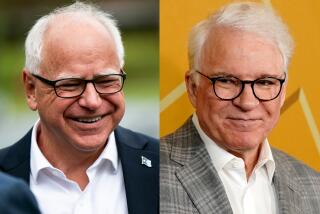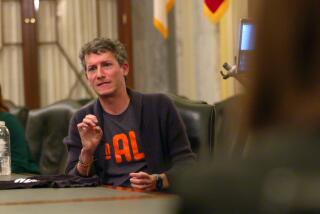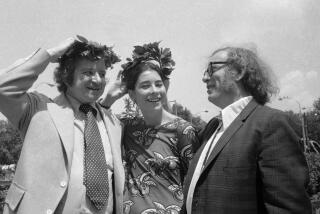His chats with God go from page to screen
- Share via
Neale Donald Walsch works hard to be humble. He isn’t always successful. Yes, he acknowledged, “more than one world leader” has requested his advice. Yes, he said, he believes he has “an answer.” Yes, his 1995 blockbuster “Conversations With God” has sold 7 million copies in more than two dozen languages, and he charges hundreds of dollars to fans who want a private audience. And yes, today his story hits the big screen with “Conversations With God,” the movie.
Walsch fights the pull of guru status with a diligent modesty. Over lunch at the Casa del Mar hotel in Santa Monica, he asked politely if he could start on his soup while it was still warm, welled up when discussing his passion for world peace and insisted that his ability to chat freely with God and occasionally read minds is something everyone could do, if only they’d just listen.
“I don’t want anyone to stop questioning me and my motives,” he said, his napkin tucked snugly under his chin, “because that’s when I become dangerous.”
Walsch was six cities into a 48-day, 19-city media tour to promote the Samuel Goldwyn Films release of “Conversations.” He looked the part of Oregon-based wise man, dressed comfortably, bearded with longish gray hair and a demeanor that suggested an awareness of his VIP-ness and, at the same time, the need to disguise it by acting casual.
“People shy away from a direct encounter with God because they’re afraid they’ll be considered crazy or dangerous,” he said.
Walsch has been called a little of both, but over the years he’s become accustomed to such sniping. It’s all, he said, a cynical attempt by the media to debunk something “too good to be true.” That is, God speaking through a man as “imperfect” as Walsch. He readily admits he has been an adulterer and a bad father. He is “sorry beyond words.” Still, he said, his message is pure.
Considering Walsch’s book-sales figures, his apologies clearly have resonated with a broad audience. He’s a star in the “human potential” community, paid as much as $10,000 per appearance, with an impressive array of brand extensions. Walsch has become living proof that if carefully transcribed and properly marketed, an encounter with God can lead to all sorts of professional opportunities, not the least of which is the movies.
“Conversations,” produced and directed by Stephen Simon, starring Henry Czerny as Walsch, has a mostly unknown cast, and a very sentimental tone. It follows Walsch’s climb from a homeless encampment outside Ashland, Ore. -- where he lived for nearly a year after a car accident broke his neck and forced him out of his job -- to the sleek limo and adoring crowds that came after God talked back.
The movie is short on personal information, at Walsch’s insistence. It bypasses his five failed marriages and his nine children (now aged 14 to 38), he said, in the interest of maintaining family members’ privacy and preserving the simplicity of the story. Instead, the film focuses on his lone journey using a series of inscrutable flashbacks and mournful gazes.
The movie opens with Walsch circa 1996 on stage before an audience so adoring they could be part of an infomercial. Then it shifts to the dark years in the early 1990s, as Walsch’s life implodes. One night, after yet another layoff, Walsch wakes around 4 in the morning and starts an angry letter to God. And God answers. Walsch writes the dialogue on legal yellow pads, has it typed up, then submits it for publication. The small, Virginia-based Hampton Roads Publishing buys the book; it sells out its initial print run of 5,000 copies in two months. After sales hit 50,000, Putnam pays $1.5 million for the worldwide rights.
Walsch sees the movie as an opportunity to spread the message of his books: that, among other things, we are all one with God. But Walsch’s teachings don’t fit neatly into today’s polarized climate. He’s not an evangelical Christian or affiliated with any denomination. On one hand, his message is a melange of self-help relativism and self-actualization directives. On the other, the books recognize Jesus Christ as a “master” and attempt to update biblical teachings.
“Hitler went to heaven,” he writes in “Conversations With God.” “When you understand this, you will understand God.”
This bit of wisdom first surfaced in the 1980s as a photocopied essay of sorts. But back then it wasn’t credited to God. It was credited to Neale Marshall-Walsch, which was then his married name. At the time, Walsch was giving talks to Church of Religious Science congregations, an opening act to his boss, minister Terry Cole-Whittaker. Walsch had started writing about God too. In the Hitler piece, Walsch asserted that the Nazi dictator wasn’t punished for his actions but, at death, he relived them as if on the receiving end.
When asked about this, Walsch gave a lengthy explanation. The notion came to him during two predawn messages from God two years apart, long before the series. The first time he shelved the writing and lost track of it. The second time, he said, he was certain the piece was divinely inspired.
“The first four paragraphs were word for word what I’d written two years earlier,” said Walsch, in a phone call from Phoenix where he was ending his media tour. “Word. For. Word. If I was an autistic savant perhaps I could understand how I could do that. Then I knew something was going on.”
In addition to the “Conversations With God” trilogy -- works that he said came from a three-year dialogue -- there are the “Conversations With God” books on tape, the “Little Soul” series for children, the guidebooks, wedding vows, book for teens, Windham Hill collection of songs, meditations, question-and-answers, even “Conversations With God: Making of the Movie,” published in September by Hampton Roads.
To his credit, a portion of his fees go back into ReCreation, the Foundation for Personal Growth and Spiritual Understanding, an Ashland, Ore.-based nonprofit that holds seminars, lectures and workshops based on his books. He also donates 20% of the seats at each of his retreats and workshops to people who otherwise could not afford to attend.
Walsch speaks slowly, in the complete sound bites of a nationally syndicated radio talk-show host, which he was as “Bob White,” his nom de microphone on several Oregon-based shows, including “Radioactive Talk.” After he’d spent several minutes explaining his plan for world peace, he was suddenly struck by emotion, tearing up as he paraphrased John F. Kennedy’s 1961 inaugural speech.
“All this will not be finished in the first 100 days,” he said, his voice wavering, “not in the first 1,000 days. Nor in my lifetime. But let us begin.”
Walsch’s media savvy comes from decades of experience in the field, including stints as the founding managing editor of a weekly newspaper in Maryland and as media liaison for Elisabeth Kubler-Ross, author of the groundbreaking book “On Death and Dying,” and for Cole-Whittaker, both in the San Diego area.
The youngest of four sons, Walsch was raised in Milwaukee by devout Catholics, a postal worker father, whom he remembers as emotionally abusive, and a homemaker mom who once told him he would never love anyone. He was an altar boy and planned to join the priesthood but his father stopped him. Later in life he studied several religions and came close to joining the Presbyterian ministry.
Today, Walsch lives in Medford, Ore. with his sixth wife, Nancy, a registered nurse who helps run his nonprofit. He spends just 12 weeks a year at home, traveling the rest of the time on the speakers circuit.
Though he said he continues to dialogue with God, Walsch said he’s written the last book in the “Conversations” series with “Home With God in a Life That Never Ends, a Wondrous Message of Love in a Final Conversation With God,” published earlier this year by Simon & Schuster. His work on that front, he reasoned, is done.
“I’ve said really all that I have to say, all that I think can be said, through those 10 books and 3,000 pages of dialogue,” he said. “That body of work will stand for many, many years, long after I’ve left the Earth.”
More to Read
Only good movies
Get the Indie Focus newsletter, Mark Olsen's weekly guide to the world of cinema.
You may occasionally receive promotional content from the Los Angeles Times.









